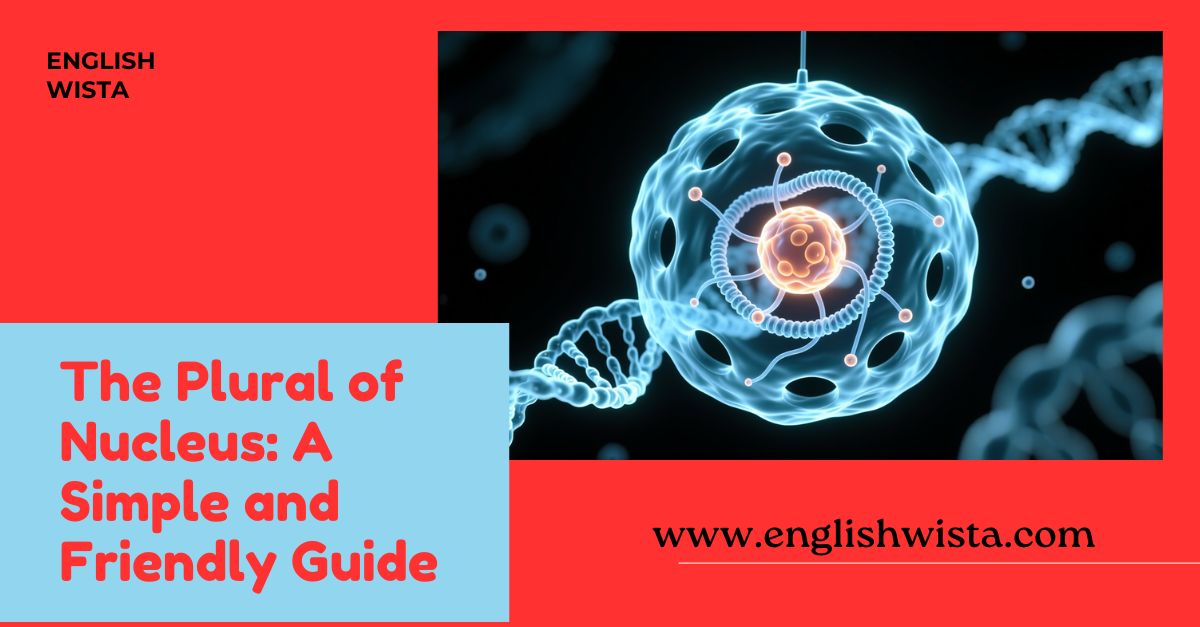Have you ever stumbled across a tricky scientific word and thought, “Wait… how do I even make this plural?” Don’t worry you’re not alone. The English language can be full of surprises, especially when it borrows words from other languages like Latin or Greek. One of those fascinating words is nucleus.
If you’ve studied biology, chemistry, or even just read about atoms or cells, you’ve probably seen this word. But when we’re talking about more than one, what’s the correct form? Is it nucleuses? Or maybe nuclei? That’s exactly what we’re going to explore in this article.
We’ll break it down step by step in the simplest way possible. By the end, you’ll know the right plural of nucleus, understand why it looks the way it does, and be able to use it confidently in everyday writing or conversations. So let’s jump right in!
What Does “Nucleus” Mean?
Before we worry about the plural, let’s make sure we’re clear on the meaning of nucleus.
The word nucleus comes from Latin, where it originally meant “kernel” or “little nut.” In English, it usually refers to a central or most important part of something. Depending on the field, the meaning changes slightly:
- Biology: The nucleus is the control center of a cell where DNA is stored.
- Physics/Chemistry: The nucleus is the dense core of an atom, made of protons and neutrons.
- General Use: Sometimes, nucleus is used to mean the core or center of an idea, group, or organization.
In short, the nucleus is always about the center the part that holds everything together.
So, What Is the Plural of Nucleus?
Here’s the simple answer:
The plural of nucleus is nuclei.
Yes, that’s right nuclei (pronounced NOO-klee-eye or NYOO-klee-eye).
This comes from Latin rules of grammar. Words ending in -us in Latin often change to -i in the plural. For example:
- cactus → cacti
- fungus → fungi
- stimulus → stimuli
Nucleus follows this same pattern, so its correct plural form is nuclei.
Is “Nucleuses” Ever Correct?
Now you might be wondering: “Can I just say nucleuses instead?”
Technically, yes, but it’s far less common. In scientific and academic writing, nuclei is the standard and preferred form. You might see nucleuses in very casual English, but it can sound unusual or even incorrect in formal settings.
So, if you want to sound confident and precise, always go with nuclei when talking about more than one nucleus.
Example Sentences Using “Nucleus” and “Nuclei”
Let’s make this practical. Here are some sentences to show how the word is used in both singular and plural forms:
- Singular (nucleus):
- The nucleus of a cell contains genetic material.
- The nucleus of an atom holds protons and neutrons.
- At the nucleus of their argument was a simple misunderstanding.
- Plural (nuclei):
- Plant cells have large nuclei that control their functions.
- Scientists studied the nuclei of different elements.
- The committee formed several small groups, with the leaders acting as the nuclei of discussion.
Notice how nuclei fits naturally in both scientific and everyday contexts.
Why Does It Change to “Nuclei”?
Good question! The answer lies in the word’s Latin origin.
English has borrowed thousands of words from Latin and Greek. Many of these words keep their original plural forms. For words ending in -us in Latin, the plural is often -i. That’s why we have nucleus → nuclei.
It’s the same reason we say:
- alumnus → alumni
- radius → radii
- syllabus → syllabi (although syllabuses is also common)
So, even though English usually makes plurals by adding -s, Latin-based words sometimes follow older patterns. That’s why nucleus changes to nuclei.
Is “Nuclei” Singular or Plural?
Here’s a point of confusion for many learners.
- Nucleus is singular (just one).
- Nuclei is plural (more than one).
For example:
- One cell has one nucleus.
- Many cells have many nuclei.
So remember: if you’re talking about a single central point, use nucleus. If you’re talking about multiple, use nuclei.
Comparing with Other Similar Words
Sometimes it helps to compare nucleus with other Latin-based words to make the pattern easier to remember.
Here are some examples:
- Cactus → Cacti
- Fungus → Fungi
- Radius → Radii
- Stimulus → Stimuli
See the similarity? They all end in -us and change to -i in the plural.
So next time you’re unsure, just think of cactus/cacti or fungus/fungi. That should remind you that nucleus becomes nuclei.
Everyday Uses of “Nucleus”
While the word is common in science, you might also see it in everyday life. For example:
- “The nucleus of the team is its dedicated core members.”
- “The family forms the nucleus of society.”
- “Artists were the nuclei of the cultural movement.”
This shows that nucleus and nuclei aren’t just for scientists they can be used in general conversations too.
Fun Facts About the Word Nucleus
Let’s lighten things up with some fun extras about the word!
- Origin Story: The Latin word nucleus came from nux, meaning “nut.” Just like the nut’s kernel is its center, the nucleus is the center of a cell or atom.
- Multiple Fields: Did you know nucleus is used in biology, physics, astronomy, and even sociology? It’s a truly versatile word.
- Pronunciation Tip: Both pronunciations of nuclei (NOO-klee-eye and NYOO-klee-eye) are correct. It’s just a matter of preference or regional accent.
- Metaphorical Use: Sometimes writers use nucleus in a poetic way to mean the heart or soul of something. For example: “At the nucleus of her being was kindness.”
Quick Recap
We’ve covered a lot, so let’s make sure the main ideas are crystal clear:
- Nucleus means the central or most important part.
- The plural of nucleus is nuclei.
- Nucleuses exists but is very rare.
- Use nucleus for one, nuclei for more than one.
- It follows Latin rules, just like cactus → cacti.
- You’ll see it in science, but also in everyday English.
Conclusion
So, what’s the final takeaway?
The word nucleus may look tricky, but it’s actually easy once you know the rule. The correct plural is nuclei, and you’ll sound more natural and confident if you use it this way. Remember, nucleuses might pop up occasionally, but nuclei is the preferred and widely accepted form.
Think of it this way: whether you’re talking about the nucleus of a cell, the nucleus of an atom, or the nucleus of a group of friends, you now know exactly how to make it plural. And that’s a pretty powerful skill to have!
Language is full of little puzzles like this, and each time you solve one, you become just a bit stronger in your communication. The next time you see nucleus in a book, article, or lecture, you’ll know right away whether it’s singular or plural and you’ll never be confused again.
So go ahead, use your new knowledge, and let this word become part of the growing nucleus of your vocabulary!



